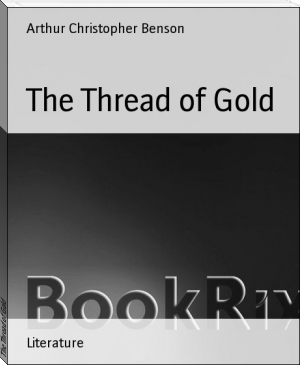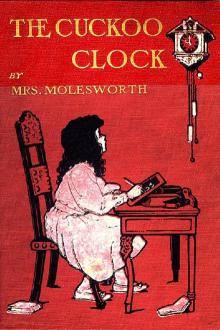The Thread of Gold, Arthur Christopher Benson [free ebook reader for pc .TXT] 📗

- Author: Arthur Christopher Benson
Book online «The Thread of Gold, Arthur Christopher Benson [free ebook reader for pc .TXT] 📗». Author Arthur Christopher Benson
A whole company of amiable dogs, spaniels and terriers, came out with an effusive welcome; a big black yard-dog, after a loud protesting bark, joined in the civilities. And there I sat down in the warm sun, to drink in the beauty of the scene, while the moor-hens cried plaintively in the moat, and the dogs disposed themselves at my feet. The man who designed this old place must have had a wonderful sense of the beauty of proportion, the charm of austere simplicity. Generation after generation must have loved the gentle dignified house, with its narrow casements, its high rooms. Though the name of the house, though the tale of its dwellers was unknown to me, I felt the appeal of the old associations that must have centred about it. The whole air, that quiet afternoon, seemed full of the calling of forgotten voices, and dead faces looked out from the closed lattices. So near to my heart came the spirit of the ancient house, that, as I mused, I felt as though even I myself had made a part of its past, and as though I were returning from battling with the far-off world to the home of childhood. The house seemed to regard me with a mournful and tender gaze, as though it knew that I loved it, and would fain utter its secrets in a friendly ear. Is it strange that a thing of man's construction should have so wistful yet so direct a message for the spirit? Well, I hardly know what it was that it spoke of; but I felt the care and love that had gone to the making of it, and the dignity that it had won from rain and sun and the kindly hand of Nature; it spoke of hope and brightness, of youth and joy; and told me, too, that all things were passing away, that even the house itself, though it could outlive a few restless generations, was indeed debita morti, and bowed itself to its fall.
And then I too, like a bird of passage that has alighted for a moment in some sheltered garden-ground, must needs go on my way. But the old house had spoken with me, had left its mark upon my spirit. And I know that in weary hours, far hence, I shall remember how it stood, peering out of its tangled groves, gazing at the sunrise and the sunset over the green flats, waiting for what may be, and dreaming of the days that are no more.
III
Leucocholy
I have had to taste, during the last few days, I know not why, of the cup of what Gray called Leucocholy; it is not Melancholy, only the pale shadow of it. That dark giant is, doubtless, stalking somewhere in the background, and the shadow cast by his misshapen head passes over my little garden ground.
I do not readily submit to this mood, and I would wish it away. I would rather feel joyful and free from blame; but Gray called it a good easy state, and it certainly has its compensations. It does not, like Melancholy, lay a dark hand on duties and pleasures alike; it is possible to work, to read, to talk, to laugh when it is by. But it sends flowing through the mind a gentle current of sad and weary images and thoughts, which still have a beauty of their own; it tinges one's life with a sober greyness of hue; it heightens perception, though it prevents enjoyment. In such a mood one can sit silent a long time, with one's eyes cast upon the grass; one sees the delicate forms of the tender things that spring softly out of the dark ground; one hears with a poignant delight the clear notes of birds; something of the spring languors move within the soul. There is a sense, too, of reaching out to light and joy, a stirring of the vague desires of the heart, a tender hope, an upward-climbing faith; the heart sighs for a peace that it cannot attain.
To-day I walked slowly and pensively by little woods and pastures, taking delight in all the quiet life I saw, the bush pricked with points of green, the boughs thickened with small reddening buds, the slow stream moving through the pasture; all the tints faint, airy, and delicate; the life of the world seemed to hang suspended, waiting for the forward leap. In a little village I stood awhile to watch the gables of an ancient house, the wing of a ruined grange, peer solemnly over the mellow brick wall that guarded a close of orchard trees. A little way behind, the blunt pinnacles of the old church-tower stood up, blue and dim, over the branching elms; beyond all ran the long, pure line of the rising wold. Everything seemed so still, so serene, as a long, pale ray of the falling sun, which laboured among flying clouds, touched the westward gables with gold--and mine the only troubled, unquiet spirit. Hard by there was an old man tottering about in a little garden, fumbling with some plants, like Laertes on the upland farm. His worn face, his ragged beard, his pitifully-patched and creased garments made him a very type of an ineffectual sadness. Perhaps his thoughts ran as sadly as my own, but I do not think it was so, because the minds of many country-people, and of almost all the old, of whatever degree, seem to me free from what is the curse of delicately-trained and highly-strung temperaments--namely, the temptation to be always reverting to the past, or forecasting the future. Simple people and aged people put that aside, and live quite serenely in the moment; and that is what I believe we ought all to attempt, for most moments are bearable, if one only does not import into them the weight of the future and the regret of the past. To seize the moment with all its conditions, to press the quality out of it, that is the best victory. But, alas! we are so made that though we may know that a course is the wise, the happy, the true course, we cannot always pursue it. I remember a story of a public man who bore his responsibilities very hardly, worried and agonised over them, saying to Mr Gladstone, who was at that time in the very thick of a fierce political crisis: "But don't you find you lie awake at night, thinking how you ought to act, and how you ought to have acted?" Mr Gladstone turned his great, flashing eyes upon his interlocutor, and said, with a look of wonder: "No, I don't; where would be the use of that?" And again I remember that old Canon Beadon--who lived, I think, to his 104th year--said to a friend that the secret of long life in his own case was that he had never thought of anything unpleasant after ten o'clock at night. Of course, if you have a series of compartments in your brain, and at ten o'clock can turn the key quietly upon the room that holds the skeletons and nightmares, you are a very fortunate man.
But still, we can all of us do something. If one has the courage and good sense, when in a melancholy mood, to engage in some piece of practical work, it is wonderful how one can distract the great beast that, left to himself, crops and munches the tender herbage of the spirit. For myself I have generally a certain number of dull tasks to perform, not in themselves interesting, and out of which little pleasure can be extracted, except the pleasure which always results from finishing a piece of necessary work. When I am wise, I seize upon a day in which I am overhung with a shadow of sadness to clear off work of this kind. It is in itself a distraction, and then one has the pleasure both of having fought the mood and also of having left the field clear for the mind, when it has recovered its tone, to settle down firmly and joyfully to more congenial labours.
To-day, little by little, the cloudy mood drew off and left me smiling. The love of the peaceful and patient earth came to comfort me. How pure and free were the long lines of ploughland, the broad back of the gently-swelling down! How clear and delicate were the February tints, the aged grass, the leafless trees! What a sense of coolness and repose! I stopped a long time upon a rustic-timbered bridge to look at a little stream that ran beneath the road, winding down through a rough pasture-field, with many thorn-thickets. The water, lapsing slowly through withered flags, had the pure, gem-like quality of the winter stream; in summer it will become dim and turbid with infusorial life, but now it is like a pale jewel. How strange, I thought, to think of this liquid gaseous juice, which we call water, trickling in the cracks of the earth! And just as the fish that live in it think of it as their world, and have little cognisance of what happens in the acid, unsubstantial air above, except the occasional terror of the dim, looming forms which come past, making the soft banks quiver and stir, so it may be with us; there may be a great mysterious world outside of us, of which we sometimes see the dark manifestations, and yet of the conditions of which we are wholly unaware.
And now it grew dark; the horizon began to redden and smoulder; the stream gleamed like a wan thread among the distant fields. It was time to hurry home, to dip in the busy tide of life again. Where was my sad mood gone? The clear air seemed to have blown through my mind, hands had been waved to me from leafless woods, quiet voices of field and stream had whispered me their secrets; "We would tell, if we could," they seemed to say. And I, listening, had learnt patience, too--for awhile.
IV
The Flower
I have made friends with a new flower. If it had a simple and wholesome English name, I would like to know it, though I do not care to know what ugly and clumsy title the botany books may give it; but it lives in my mind, a perfect and complete memory of brightness and beauty, and, as I have said, a friend.
It was in a steep sea-cove that I saw it. Round a small circular basin of blue sea ran up gigantic cliffs, grey limestone bluffs; here and there, where they were precipitous, slanted the monstrous





Comments (0)